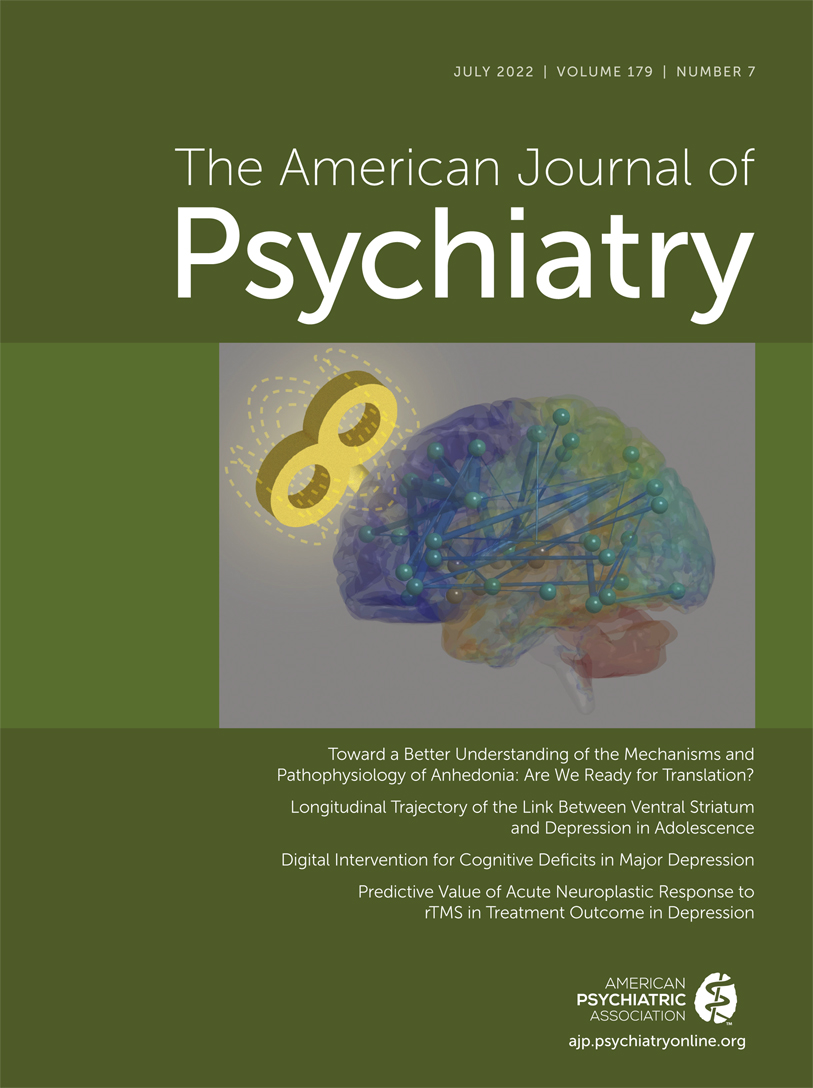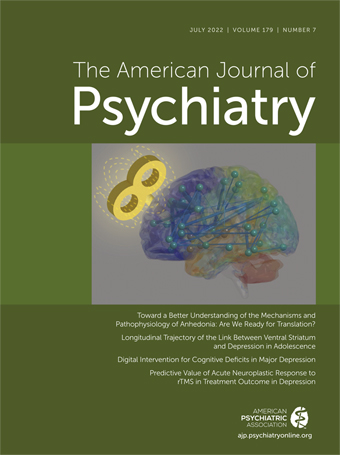Cognitive impairment in major depressive disorder is a challenging feature of the illness, because it commonly persists in people who experience some degree of symptomatic improvement, even those who reach euthymia (
1). As a result, successful treatment of symptoms, which itself occurs only about half of the time or less with current treatments (
2), does not promise disability reduction. Because of the longtime focus on symptoms in major depression, alternative approaches to treating partial to negligible response to treatment have been examined for decades (
3,
4). Many of these approaches have risks of side effects and adverse events, and many people with treatment-resistant depression are reluctant to consider them.
Cognitive impairments are not improved by typical antidepressant treatment (
5) or the other treatments used for partial response (ECT, atypical antipsychotic medications) and may in fact be worsened. Thus, development of either pharmacological or remediation-focused treatments for cognitive impairment are a high priority. There is currently a single drug, vortioxetine, that includes language in its labeling suggesting cognitive benefit, and that is for the single, albeit important, cognitive domain of processing speed.
As a result, the clinical trial by Keefe et al. (
6) presented in this issue of the
Journal is particularly important, with several important features. The study examines the efficacy of a technology-based intervention: “AKL-T03” is a multitasking video intervention in which participants simultaneously respond to or ignore stimuli based on prior instruction while navigating in space to approach or avoid these designated targets or nontargets. The intervention is remotely deliverable with commonly available technology and as a result is “pandemic proof.” The control condition used in the study is very adequate and is itself cognitively demanding, thus increasing confidence in the findings. The results demonstrated that with training on AKL-T03, both the primary performance-based cognitive outcome—performance on the Test of Variables of Attention, which would be unlikely to be employed in typical clinical practice—and a composite exploratory cognitive outcome separated from the control condition. Adherence was good and tolerability was excellent. Thus, the intervention improved performance as measured by neuropsychological tests.
The control condition was a word puzzle video game. An array of letters was presented on the screen, and the task was to connect adjacent letters in a horizontal, vertical, or diagonal orientation to form as many words of at least two letters as possible during a 25-minute period.
There are a few comments on the study that need to be made. The control condition led to better session-to-session participation on the part of the participants. Participants also seemed to like it a little more. This control task is a computerization of a common paper and pencil word puzzle that the participants may have been familiar with previously. It also seems, based on data presented in Table 2 but not referenced elsewhere in the report, that control participants reported fewer cognitive impairments after treatment, as indexed by the Perceived Deficits Questionnaire. Thus, they manifested a subjective improvement in performance that was not supported by the objective data collected. The control condition may have been seen by participants as more likely to improve cognition because of its obvious cognitive demands and greater subjective engagement.
Why would there be a perceived cognitive improvement that is greater than objective cognitive gains? As the authors note, the active intervention has obvious time pressure demands and may have led to less subjective enjoyment or a negative reaction to the test, possibly resulting in underestimated cognitive gains. These findings point to the fact, which has been addressed before, that there can be disjunctions between objective and subjective treatment outcomes in training situations. In a cognitive training study in veterans with traumatic brain injury, Mahncke et al. (
7) found that training on two of the speed training components of the Brain HQ computerized cognitive training system led to significant gains on a composite index of cognitive test performance compared to a video game control. Interestingly, there are several parallels between the findings of that study and the Keefe et al. study. In the Mahncke et al. study, participants in the video game control condition completed nonsignificantly more training sessions (8%). There was also a significant improvement in several self-report measures of perceived cognitive deficits and general well-being among participants in the control condition in that study. These subjective improvements were found in the context of a quite large difference in objective cognitive gains with active training, with an effect size (d) of 0.56 between groups. At the end of treatment, the gains on the cognitive performance–based outcome measures were four times as great in active training, and that benefit increased to five times as large at the follow-up, despite no differences across the two treatments in the extent of subjective improvement on self-reported cognitive measures. Importantly, self-reported depression also improved equivalently in both treatment arms. Finally, there were no changes from baseline in a performance-based measure of the ability to perform everyday functional skills in either treatment arm.
There are several important take-home messages from the Keefe et al. study and from previous efforts. First, despite the effort required to implement formal cognitive assessments in clinical practice, asking people with neuropsychiatric conditions how much their cognition has improved does not give an answer that is consistent with objective data. Much like the baseline data on the modest correlation between perceived and actual cognitive and functional capacity deficits (
8), change scores on self-report measures seem to be highly vulnerable to expectation effects and commonly manifest changes that are considerably larger than changes on neuropsychological performance measures (
9). Second, it may be important for digital training efforts to consider the enjoyability of the intervention. While it may be the case that active cognitive effort is required to make legitimate training gains, unless enjoyability is perceived, both training effort and subjective outcomes may be affected.
Finally, immediate functional gains on self-report measures were not detected despite cognitive gains in the active training group. Like the results of the Mahncke et al. study (
7), short-term cognitive gains did not translate into detectable functional changes.
Would a training intervention that leads to objective cognitive gains lead to functional improvements if the trainees were only modestly aware of their gains, or their level of baseline performance? Would a control training intervention that leads to subjective improvements in perceived cognitive deficits and well-being facilitate functional gains? As noted by Keefe et al., it is possible that engagement in a positively valanced activity could lead on its own to facilitation of functioning through motivation to engage in more functionally relevant activity. Clearly, effort and anticipated pleasure are both impacted by the symptoms of major depression. As noted by the authors, it is very plausible that increasing the enjoyability of digital training interventions might support the objective cognitive gains that accrue and lead to a greater potential impact on daily functioning through encouragement of efforts to deploy those improved cognitive skills and improve functioning. This is potentially very important, as a recent study (
10) suggested that improvements both in objective cognitive performance and subjective assessments of performance were correlated with improvements in everyday functioning following treatment for major depression.
Challenges associated with depression-related response biases in self-assessment are not easy to overcome. Current treatments lead to a low rate of remission, meaning that euthymic patients are in the minority. Focusing cognitive training efforts only on euthymic patients who might have fewer depression-related response biases would lead to exclusion of the majority of participants, some of whom might obtain significant cognitive gains from the intervention. It may be more appropriate to consider other interventions that, although somewhat labor intensive, may be able to lead to congruent improvement in objective and subjective cognitive deficits in mood disorders. As misperceiving cognitive impairments, regardless of the reason, is a failure in self-assessment (commonly referred to as “introspective accuracy”), interventions aimed at increasing the validity of self-assessment may be useful and increase the chances that objective cognitive gains would translate into functional improvements.
Metacognitive training, originally developed for psychosis, has been adapted and broadly applied in major depression and subclinical sad mood states (
11). Meta-cognitive training is a structured, clinician-delivered intervention focused on reducing biases, focusing on realistic elements of functioning, and increasing activity levels to engage in positive activities. In some ways it is similar to cognitive-behavioral therapy targeting delusions, but the goals are broader and aimed at increasing the ability to self-evaluate functioning in multiple domains. There is a broad evidence base for this approach, and digital deployment of this training related to depression has recently been rolled out (
11). It is possible that a joint metacognitive and neurocognitive training intervention could be developed, in line with efforts to combine cognitive training and functional skills training (
12).
Such an intervention would combine the objective benefits of cognitive training as delivered by the AKL-T03 application and an improved ability to detect and deploy these cognitive gains. The wholly digital nature of the interventions would certainly increase their practicality and accessibility to a broader group of people with major depression. However, the encouraging results for cognitive enhancement with a digital therapeutic are clearly very important on their own, and efforts to broaden and generalize those benefits, as well as increasing access, would be very helpful.

